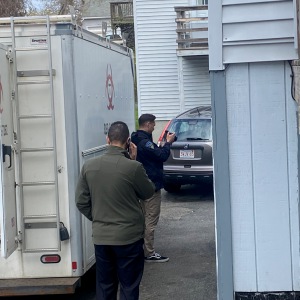My Turn: Farm bill’s food aid urgently needed

mactrunk mactrunk
| Published: 11-06-2023 9:34 PM |
Food banks are facing a food crisis. Two hundred food banks nationwide, including the Food Bank of Western Massachusetts, form the Feeding America national network of food banks. A majority of food banks, which collectively serve almost every county in the country, report steady or increased demand for food since June 2021.
In western Massachusetts, demand for food assistance, while having decreased from the height of the pandemic, has not returned to pre-pandemic levels. Inflation, the high cost of housing, health care and child care, and the end of pandemic-era benefits have all driven more people to food pantries across our region in search of assistance. This is happening while donations to food banks throughout the country are declining and the cost of food is rising, making it costlier for us to meet the food needs in our community.
The farm bill is our country’s most meaningful source of food and agriculture funding and is a crucial tool to prevent food insecurity and hunger. It authorizes funding for programs such as TEFAP (The Emergency Food Assistance Program), which is distributed through food banks and ensures that food from U.S. farms and producers gets to households facing food insecurity; SNAP (Supplemental Nutrition Assistance Program), which helps households afford groceries; school meals; and WIC (Special Supplemental Nutrition Program for Women, Infants, and Children).
The farm bill impacts if and how millions of people in our country can put food on the table. Normally, it is reauthorized by Congress every five years. However, the current farm bill expired on Sept. 30 and has not yet been taken up by Congress due to disagreements about the federal budget and the delay in electing a new speaker of the House.
These federal nutrition programs, combined with other public and private partnerships such as food banks, create a critical food safety net for people facing food insecurity or hunger. Two-thirds of households that receive SNAP include children, seniors and people with disabilities.
In Massachusetts, 42% of people facing hunger are unlikely to qualify for SNAP. Many working households turn to the food assistance network — food banks, food pantries, and community meal sites — to help fill the gap. Food banks rely on programs like TEFAP to help ensure these households can put nutritious food on the table.
If lawmakers do not consider the farm bill soon, many federal agriculture and nutrition programs are at risk of being underfunded. This would put additional strain on farmers, food banks like ours, and everyone who struggles to afford food.
Even more alarming, the dysfunction in Washington may lead to a government shutdown. If that happens, federal employees, active-duty military members and people who work for a federal contractor could temporarily find themselves without a paycheck. Our region’s food assistance network that includes more than 170 frontline food pantries and meal sites will be the first, and potentially only, option for assistance for many of these people — further exacerbating the food crisis.
Article continues after...
Yesterday's Most Read Articles
 On The Ridge with Joe Judd: What time should you turkey hunt?
On The Ridge with Joe Judd: What time should you turkey hunt?
 Franklin Tech student welds artistic bench for French King Bridge
Franklin Tech student welds artistic bench for French King Bridge
 Formed 25,000 years ago, Millers River a historic ‘jewel’
Formed 25,000 years ago, Millers River a historic ‘jewel’
 Police report details grisly crime scene in Greenfield
Police report details grisly crime scene in Greenfield
 Authorities ID victim in Greenfield slaying
Authorities ID victim in Greenfield slaying
 ‘I have found great happiness’: The Rev. Timothy Campoli marks 50 years as Catholic priest
‘I have found great happiness’: The Rev. Timothy Campoli marks 50 years as Catholic priest
We are grateful to our elected officials — U.S. Reps. Richard Neal and Jim McGovern and Sens. Elizabeth Warren and Ed Markey — for their support of these programs in the farm bill that strengthen food security. Congress must take urgent action to pass a bipartisan farm bill and budget for this year to avert a government shutdown. Our neighbors facing food insecurity and hunger, and food banks like the Food Bank of Western Massachusetts who proudly serve them, are counting on lawmakers to act.
Andrew Morehouse is executive director, Christina Maxwell is program director and Laura Sylvester is public policy manager at the Food Bank of Western Massachusetts in Chicopee.

 Anne R. George: City should help seniors keep their homes
Anne R. George: City should help seniors keep their homes Tom Peabody: Lucky to have Blake Gilmore
Tom Peabody: Lucky to have Blake Gilmore My Turn: A ruthless strategy that damages US
My Turn: A ruthless strategy that damages US Analee Wulfkuhle: Shores Ness a vote for Deerfield’s future
Analee Wulfkuhle: Shores Ness a vote for Deerfield’s future
